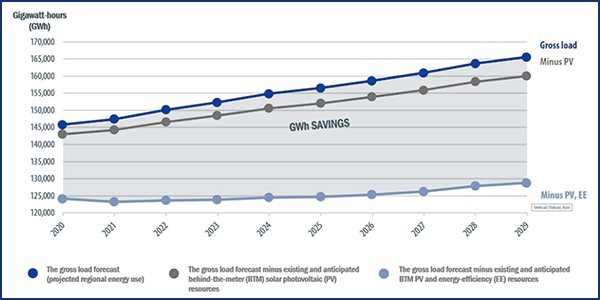FERC on Wednesday approved changes to ISO-NE’s tariff that eliminate capacity performance payments for energy efficiency resources (ER21-943). The revisions became effective Thursday.
ISO-NE’s Pay-for-Performance (PfP) capacity market construct is meant to link revenues to resource performance during real-time operational reserve deficiencies via incentives to resources to provide real-time energy or reserves.
“We agree with ISO-NE that energy efficiency resources are not similarly situated to other capacity resources in that they are not able to respond to Pay-for-Performance incentives during capacity scarcity conditions,” the commission wrote.
FERC disagreed with trade group Advanced Energy Economy, which filed a protest that said the RTO’s proposal would result in “unjust and unreasonable and unduly discriminatory treatment” of EE resources. The commission noted that the Federal Power Act “does not prohibit all discrimination, only undue discrimination.”
It added that it recognizes EE resources’ value but disagreed with AEE’s contention that they are “similarly situated to nuclear and natural gas resources.” The commission found that EE resources, which cannot provide real-time energy or reserves during capacity scarcity conditions, cannot compare to other resources. It cited a nuclear generator as an example because it could adjust its maintenance schedule to increase the likelihood that it will be online and provide its full capability or reserves during capacity scarcity conditions.
FERC was also not persuaded by AEE’s argument that EE resources are incentivized “to meet or exceed their capacity supply obligations [CSOs] and that accepting ISO-NE’s proposal would remove that incentive.”
“We find that AEE’s arguments misconstrue the intent of ISO-NE’s performance payments, which is to incent the real-time provision of energy or reserves during capacity scarcity conditions,” the commission wrote. “In contrast, compensation for installed capacity, across all resource types, is made by the FCM’s [Forward Capacity Market] monthly base payments, which energy efficiency resources will continue to receive.”
AEE argued that EE resources exceeding their CSOs should continue to receive performance payments during EE measure hours. But, according to FERC, the RTO proved that EE resources do not overperform or underperform during real-time capacity scarcity conditions.
LS Power and the RTO’s Internal Market Monitor, which joined the New England Power Generators Association in filing comments supporting the tariff revisions, noted that EE resources would continue to receive base capacity payments commensurate with their CSOs.
Clements Concurs, but Says FERC May ‘Revisit’
In a concurring statement, Commissioner Allison Clements said that as EE programs “continue to evolve and innovate,” FERC may have to “revisit their eligibility” for future PfP penalties and bonuses.
Clements said that when the commission directed ISO-NE to adopt the PfP construct in 2014, it rejected the RTO’s proposal to require EE resources to either install metering or face guaranteed penalties if a reserve deficiency occurs outside of measured hours. She said that the RTO made an “adequate demonstration” to exclude EE resources from PfP, but now they are “without an avenue” to participate even with the installation of metering as in the original proposal.
With the continued innovation of EE programs, Clements added, they might eventually measure real-time performance.
“Should programs that explicitly measure meter-based energy savings develop in New England, [EE resource] participation rules may warrant a fresh look,” Clements wrote.




